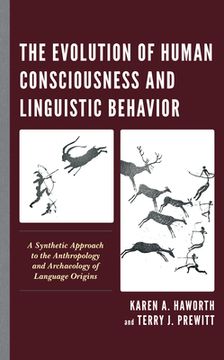The Evolution of Human Consciousness and Linguistic Behavior: A Synthetic Approach to the Anthropology and Archaeology of Language Origins (en Inglés)
Reseña del libro "The Evolution of Human Consciousness and Linguistic Behavior: A Synthetic Approach to the Anthropology and Archaeology of Language Origins (en Inglés)"
Drawing from the disciplines of cognitive science, Paleolithic anthropology, art history, and semiotics, Karen A. Haworth and Terry J. Prewitt offer a novel discussion of the origins of language, based primarily in the distinction of holistic versus analytical cognitive processing. Also, by employing a refined view of human symboling capacities grounded in the writings of C. S. Peirce, they provide a short but comprehensive explanation of what the artifacts and art of the Paleolithic and Mesolithic periods suggest about language origins. Their interpretation supports a semiotic argument that "iconic and indexical logical modeling" precedes human elaboration of experience by symbolic reference in words or propositions, and ultimately in what Peirce called "the argument." Further, they suggest that the use of symbols to model the world developed rapidly between about 20,000 and 10,000 years ago, and has the effect of giving emphasis to analytic thought as the dominant mode of human consciousness. Rather than seeing symbols as the impetus for human logic, they argue for presymbolic elements of logic in Peirce's sign categories shared widely by humans and other animals.Intended readers are scholars in philosophy, anthropology, psychology, linguistics, and semiotics, as well as interested nonspecialists. The presentation is also complemented with brief personal narratives, intended to offer background that helps make a dense academic argument more accessible to the widest audience possible. The authors' insights into the basis for language have ramifications for any number of other fields: education, psychology, philosophy, prehistory, and art, to name a few.

